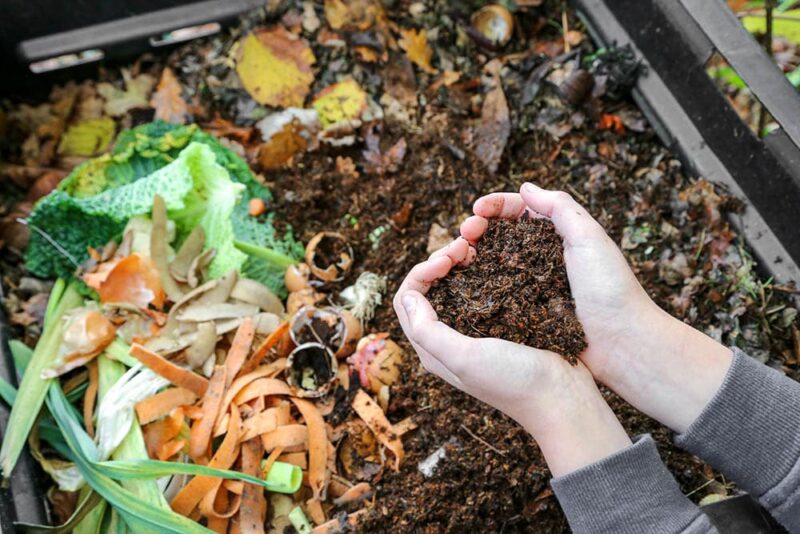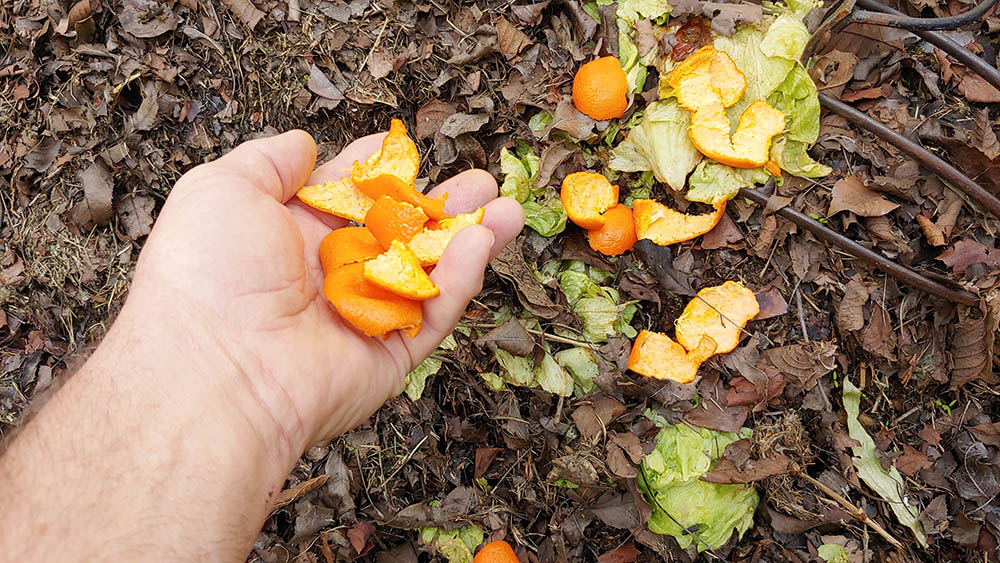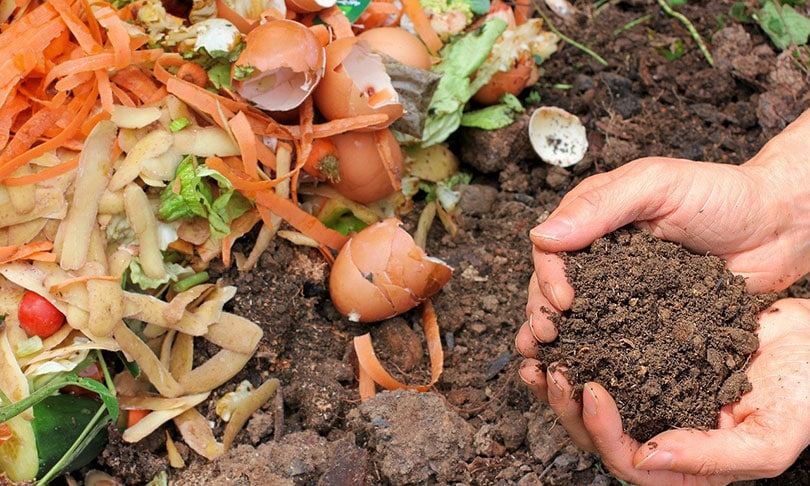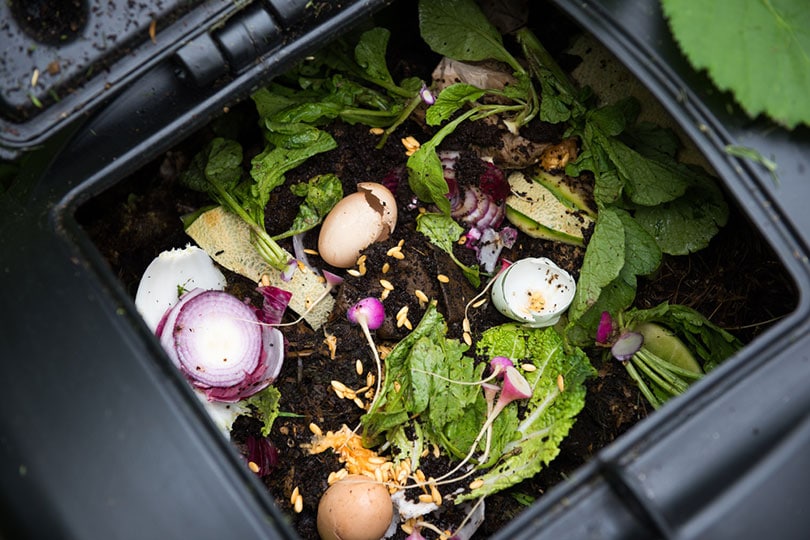What is Organic Compost? Pros, Cons, & FAQ
-
Pete Ortiz
- Last updated:

Compost is the natural process of breaking down materials into a usable substance, often for the purpose of gardening. Compost is a great way to create fertilizer from recycled materials. Composting is extremely popular, and it can be done at home on the counter or in massive piles on commercial farms. Composting is a natural process, but does that mean that all compost is organic? What exactly is organic compost? This brief guide will cover all of the basics of organic compost, including the differences between it and non-organic compost, as well as how it works, where it is used, and some advantages and disadvantages. Organic compost is simply a compost pile made with entirely organic materials. Some compost piles can have non-organic additives to help the process, but these additives turn an organic compost pile into a non-organic compost pile.
How Does It Work?
Composting works by facilitating the natural degradation process of certain materials. Compost piles need three things to function correctly. Compost piles need water, air, and organic material to work. All of these things have to be done in balance with one another to create a viable composting solution. Too much water will leave the pile soaked and unable to start the degradation process. Not enough water and the microbes won’t have anything to drink. There needs to be oxygen to feed the microbes that break down the materials. If you don’t have some organic material, then there will be nothing to break down. When compost works, the organic materials will turn into soil which can be used in gardens or farms.

What Are the Different Types of Organic Compost?
There are two main types of organic compost. Organic compost can be homemade or commercially manufactured. Homemade organic compost is created, cultivated, and used at home for individual use in personal gardens or small hobby farms. Commercial organic compost is created and packaged for sale or for large scale use. If you buy organic compost online, you are buying commercially manufactured compost. But commercially manufactured compost can still be 100% organic.
Homemade compost is usually organic because homeowners rarely put inorganic material into their personal compost piles.
- Coffee grounds
- Old food
- Vegetable scraps
- Paper
- Cloth fibers
While organic compost is made from entirely organic materials, not all organic material is good for composting. For example, dairy products and meats should never be used in compost because they are not suitable for the composting process.
Where Is It Used?
Organic compost is used in a variety of places. Organic compost is simple for people to start on their own at home. One of the most common places to find organic compost is in people’s yards. All you need to start an organic compost pile at home is organic material like food scraps or paper, somewhere to put it where it will get plenty of air and natural water and some time and attention.
Organic composting is also used on commercial farms and in large gardens where the recycling of large amounts of organic material is popular. Some organic compost piles can get truly massive.
The compost itself can be used as a fertilizer in several applications. Fertilizers derived from compost can be used in gardens, lawns, or farms. Wholly organic fertilizer can be used to obtain or keep an organic label. Any organic compost used as fertilizer will count as organic fertilizer, which is necessary to label something as organic.

Advantages of Organic Compost
There are three main advantages of organic compost. First, organic compost is fairly easy to create. Since it uses all organic materials, almost anyone can create a compost pile that generates organic compost. That makes it accessible. Second, organic compost can be used as organic fertilizer, which can be used to create organic products. Lastly, organic compost is transparent. You will know exactly what is in your fertilizer because you will be adding well-known organic materials to the pile over time. There won’t be any plastics or synthetics, or chemicals in the compost that you don’t know about.
If you fertilize your tomatoes with organic compost and only use organic pesticides, then you can label your tomatoes as organic tomatoes.
Disadvantages of Organic Compost
There are a couple of disadvantages of organic compost. First, the nutrient density of organic compost will only be as good as the materials used to create it. Non-organic compost can use materials to help speed up the process and add nutrients in ways that organic compost simply cannot.
The other disadvantage of organic compost is that creating an effective compost pile from entirely natural materials can take some work. If you get the balance of material, water, and air wrong, you can ruin a pile which will cause it to rot instead of composting, which can be a gross setback. Non-organic compost can use additives to help stabilize the pile and create compost faster and more effectively.

Frequently Asked Questions (FAQ)
Organic vs. Synthetic Compost
What is the difference between organic compost and synthetic (or non-organic) compost? The only difference is that organic compost contains solely organic materials. Synthetic compost contains a mixture of organic materials and non-organic additives. Some examples of non-organic compost additives include perlite, vermiculite, expanded clay aggregate, and rockwool. These materials can be used to speed up the composting process, stabilize the compost pile or add specific nutrients to the compost itself. However, using these materials voids the label of organic for compost and any plants that the compost is used on.
Synthetic compost is more likely to be found in commercial applications like manufacturing or large farms. Few homeowners or casual gardeners create their own synthetic compost.
Is Organic Compost Safer Than Other Types?
No. Organic compost is not necessarily safer than other types of compost or other types of fertilizer. Organic compost only uses organic materials, but that doesn’t mean it is safer than other products. Plenty of fertilizers, including synthetic fertilizers, are perfectly safe to use in gardens and on farms.
If you add harmful non-organic materials to a compost pile, it can make it unsafe, but few people are doing that intentionally. Synthetic compost that is purposefully using non-organic material for a specific reason is just as safe as organic compost.
Is Organic Compost Effective?
Yes. Organic compost is extremely effective. Most composts are organic, and they all have a ton of benefits for plants and soil. Non-organic fertilizer is also effective, but the non-organic elements only make the compost more potent, faster, or more stable. Most composts are organic, including store-bought compost, and most composts are incredibly effective for gardening.
Final Thoughts
Organic compost is compost created from 100% organic materials. Organic compost is extremely effective and is used in a variety of different ways, from home gardens to commercial farms. Organic compost can help keep organic labels for certain types of plants and foods. This article covered all of the basics in regard to organic compost and its uses. Rest assured that most compost is organic, and if you are cultivating your own compost pile, there is a good chance that it is 100% organic. If you are making your own organic compost, be mindful of what you put into your compost pile and ensure that it is all organic material.
Featured Image Credit: Jerome.Romme, Shutterstock
Contents



